
Familiar Faces – A Chilling Tale of Predatory Transformation by Tinamarie Cox
Familiar Faces
By Tinamarie Cox
For the past three months, Maggie had planted herself on the same bench in the northwestern quadrant of Central Park at six a.m. every morning. Placed beside her were always a brown paper bag and a paper coffee cup, both clean and empty. She did not require food and drink in the same manner as humans but needed to keep up appearances and maintain the illusion. Sitting here like this, Maggie appeared to be like any other New Yorker enjoying the cooler hours of the early summer mornings and a deli-bought breakfast.
As the joggers on the Great Hill Track passed by, Maggie studied their skin. She looked each perspiring body up and down carefully, determining collagen levels and the elasticity of their dermal layers. There was a wide range in age, but younger was preferred. She favored flesh in its prime and in good health. The better condition of the hide meant the tissues would last longer. More time for enjoyment and less time spent hunting.
Maggie, the name that had belonged to the skin she was currently in, had given her a long and pleasurable five years. But her stolen flesh had begun to pucker as of late, thinning and loosening, and starting to droop on its harsh frame. It was time for a change in coverings. Maggie’s delicate apricot coating was nearly spent.
New York City was the perfect place to acquire new skins. Becoming someone new and blending in was effortless in the twenty-first century. There were millions of hosts to choose from and all in different colors. The variety drew her, and the ease of attaining a human casing kept her lingering. A hundred years of stalking and acquisition in this city, and she hadn’t felt any exigency to leave it. One person missing out of millions was a drop of water in Earth’s ocean. She drew no suspicions.
Time had only made the process simpler for Maggie.
Naturally, her skills improved as she moved from body to body. She had made mistakes in the beginning. Been too violent with the first few when she should have been more clever. She hadn’t expected such a mess. Hadn’t known there was so much blood and viscera inside a human body.
But she had been so eager to try. So excited to keep going. To test her limits. Go beyond what she had once thought she was capable of.
Practice made perfect. Switching bodies became seamless.
And there were other factors, too, that allowed Maggie an inconspicuous lifestyle. Population growth was major, inevitable with the humans’ devotion to sexual pleasure. Humans seemed challenged when it came to controlling their desires, much less their reproductive abilities. She felt it was the greatest disadvantage of the species. To be so tightly bound to sex and rearing the inevitable offspring.
She couldn’t consider using a human during their infancy or adolescent years. Children were too helpless. Despite the soft suppleness of their skin, being commanded by another adult was unappealing. Maggie was fully grown and had left her nest ages ago.
The way society chose to isolate itself behind its technology also benefited Maggie. Whatever flashed on their handheld screens determined the next fad and the newest trend, which consumed their attention. It seemed humans could not be without their electronic devices, as if they were an extension of themselves. An enthusiastically consumed distraction from the realities of the drudgery of the human world.
Maggie had spent the last several weeks on her perch in Central Park keeping up to date on the latest social interests by watching TikTok videos on her cell phone. Many of the clips were centered around humorous topics, which she hated to admit she found entertaining. And some of the video creators poured their life stories and struggles into the camera for the whole world to see. Maggie liked these videos best. She adopted the histories and backgrounds of the TikTok users for the real-life conversations she participated in.
With the recorded stories committed to memory, she could stir up feelings of pity, compassion, or even lust in her listener. Their emotional responses made her feel more human. Continued the deception. Ultimately, it distracted her conversation partner from asking other, more troublesome questions. Like why the alcohol they were drinking wasn’t making her tipsy.
Maggie toggled between the app and observed the passing joggers. She stealthily snapped pictures of potential skin donors for later deliberation. She had noted their schedules and made her friendly face visible during their routines. She looked up, met their gaze, smiled, and angled her head cordially. Every few minutes, she reached into the paper bag standing upright by her lap and brought an empty fist to her mouth, pretending to eat breakfast and drink coffee.
Some mornings, she’d daydream about the first days in a fresh costume, how silky and soft the flesh was. She liked to run fingers along the new skin, feel how well it hugged the bones. The sensation made the human lungs feel heavy, the heart race, and the mouth water.
No part of her donor went to waste.
Once fitted into a new disguise and acclimated to its nervous system, the previous host served as a first meal. Consciousness didn’t return to the shell. The brain was ruined by her invading connectors and the gray matter disintegrated with the disentanglement. Like pulling a weed out of the ground after it had infiltrated and rooted deep into a garden bed.
The defunct flesh made an exponential shift into the decomposition process after being evacuated. Technically, the carcass had started decaying the moment it was put on. Be it delayed or negligible so long as the body’s systems remained minimally active.
The putrid smell that accompanied a rotting body drew attention. Evidence caused questions and investigation. And even this creature had to eat sometimes. Of all the mammals, the taste of human was second to none. Without a doubt, human surpassed in flavor compared to her littermates.
On other observation days, Maggie thought about the instances when young, hormone-driven bodies ensnared her in conversation with the single goal of engaging in mating rituals. She found these human practices amusing, not sharing the same desire or need for such companionship.
Coupled bodies pounding genital areas, sharing fluids, and flesh becoming hot and sticky from the exertion was overall, unappealing. However, Maggie learned the importance and the rules of these games during her adventures among the humans. Though, she did not gain the same level of satisfaction from sexual acts.
Her top priority was to remain innocuous. She paid no favor to a particular gender. Or lack thereof. She appreciated the modern sense of fluidity between sexes. The notions of male and female and fulfilling sexual needs had changed greatly in the last hundred years she had spent amidst people. She had learned that bodies fit together in multiple ways. And Maggie knew how to please any partner no matter the skin she wore.
She had gotten better at determining if a mate would become too attached and return to her with more serious intentions. Relationships complicated her lifestyle. Partners asked too many questions and wanted to be involved with everything. She could not explain to a human how slowly rotting, sagging flesh walked amongst the population. Being solitary and independent was required.
Maggie preferred to migrate across the boroughs only when necessary, like when she adopted a new disguise. Previous acquaintances noticed the change. Memories and personality were lost when she implanted herself. But after a few hours of investigating the old life, she knew who needed a goodbye to be satisfied. And which places not to haunt. These lessons had been learned the hard way at the beginning.
It wasn’t difficult to find a new apartment when she needed one. Some neighbors were nosier than others. Maggie didn’t have much on hand to pack and move. She kept enough belongings to make an apartment look lived in. And the keepsakes she was genuinely fond of remained in a storage unit.
She learned to save certain items after discovering antique shops. Some humans were willing to pay puzzling sums of money for old things that no longer served anything more than an aesthetic purpose. A lengthy existence inhabiting many lives had allowed her to accumulate a monetary cushion.
As the freshness of Maggie’s skin wore out, she felt like antiquity. Something shabby and spent, and only admired as what it used to be. The lingering memory of something gone and nearly forgotten. A word on the tip of your tongue. She didn’t like to feel as though she was fading.
Each morning, she studied the creases deepening on her hands and around her eyes. She pulled at the lines circling her throat. It took more effort to keep her mouth from frowning. She found her reflection off-putting. It hadn’t surprised Maggie why flirtations and pleasure seekers had decreased over the last several weeks. Her body looked disgusting.
Humans were shallow creatures. Wrinkling and dulling skin combined with thinning and lifeless hair was unattractive and deterred their mating drive. And it was this decrease in attention that brought Maggie a sense of urgency to find replacement tissue. She had grown to enjoy being noticed for her beauty and sexual appeal. But adamantly denied she possessed human vanity. She just wanted to feel good about herself. There wasn’t much else to her drive.
Beautiful skin made Maggie feel powerful.
Maggie was eyeing male flesh for this hunt. The last twenty years had been spent in female coverings. Before that, her costumes were alternated between the sexes. When IT first began acquiring human skins in New York City, it had sought males exclusively. Back in those early days, you had to be male to do what you wanted. No one questioned a man’s late hours or odd habits. A hundred years ago– when IT had still been something crawling and slithering and observing the human species in the shadows– it seemed a woman was more of a thing than a person. And IT had been tired of being a thing.
Before IT was Maggie, there was Ananda, and before her was Shyla. She only remembered Molly because of how short a time her skin had lasted, a mere year. She had judged Molly’s skin all wrong, or rather, it had deceived her. A century of lives and dozens of names had blended together in parts. What IT had originally been called escaped its memory. The point was to experience life, not remember the vehicle.
Christopher passed her bench for a fourth time that morning. Maggie gave her next potential covering a small smile. He had finally taken notice of her earlier in the week, stealing brief glances at her during each of his eight daily laps around the loop. He looked young enough for her predilection, and in satisfactory health.
She loved the way his tanned epidermis stretched over his pronounced cheekbones. How taut it was across his firm abdominal cavity. And how the flesh around his defined biceps glistened with perspiration in the morning sunlight. He was a fine human specimen. She was fairly certain Christopher was the one.
Her hearts synced into a quick rhythm with her sudden excitement. She fidgeted on the bench as she envisioned slipping into new skin. Shedding this expired hull and feeling the brief freedom from a body’s weight. Severing the aged links that bound her to a moribund marionette. She licked her lips as she thought about making a satisfying meal out of this faithful body she was currently in.
Maggie wanted to wear the Christopher costume as soon as possible. She imagined the strength in his well-maintained and robust body. What the ripples in his muscles must feel like when his feet pounded against the asphalt during his run. How easily she would be able to command adoration with his coy smile. The way lovers would worship the powerful way she’d use his hips.
Decision finalized, Maggie hid her phone away in the back pocket of her shorts. She put the unused coffee cup in the empty brown bag and crumpled them together for the trash can. The wait for Christopher to make his next lap was almost too long. She leaned forward on her bench, staring down the jogging path. Eyes only for him as others passed her by.
When Christopher returned to view, Maggie grinned and angled her head at him. She shifted on her perch, impatient for him to meet her gaze. When their eyes locked, Maggie felt her nerve endings pulse and the human heart lurch. This level of anticipation was better than sex. The barbs holding her inside Maggie tingled.
It was time to seize the moment.
She gave him a little wave with a shaky hand. Then, she patted the place on the bench beside her that was vacated by the fake breakfast.
Christopher slowed his pace, his interest engaged, and paused his morning jogging routine through Central Park to speak to a familiar face. He sat beside Maggie, his mouth open and catching his breath, and rested his arm along the top of the bench.
“Finished your breakfast fast today?” He stretched his long legs out in front of him and Maggie traced them with her eyes.
“I have a confession to make,” she began, flapping her eyelashes at him.
“Do tell.”
He leaned in closer and she could smell the salty trails of sweat dripping down his perfect skin and mixing with his pheromones. He was easily hooked. His scent made her mouth water. Made her buzz inside Maggie. He was a fine choice.
“I was too nervous to eat it this morning. I was hoping to meet you more formally today.” Maggie pressed her pink lips into a crooked smile and raised one of her shoulders aiming to convey shyness in her flirtation.
She formulated a new plan. The details arrived like lightning in her head. She’d do things a little differently this time. She’d play all her cards right and take him to bed first. Part of her ached to feel him inside this body before putting him on. She didn’t understand where the urge had come from, but she decided to obey it.
What was the point of living if not for a few indulgences here and there? Experiment once in a while? Evolve the methods? A hundred years of slipping from body to body needed to stay interesting.
She wasn’t becoming more human.
IT could never be human.
“Well,” he held out his hand to her, “I’m Christopher. It’s nice to meet you…?”
“You can call me Maggie,” she answered and accepted his handshake. His skin felt better than she imagined. A wave of delight coursed through her. A wide grin crept across her face.
Christopher was hers for the taking.
Predator and prey were united at last.
Original Creations
Goodbye for Now, a Short Story by Jennifer Weigel
What if ours weren’t the only reality? What if the past paths converged, if those moments that led to our current circumstances got tangled together with their alternates and we found ourselves caught up in the threads?
Marla returned home after the funeral and wake. She drew the key in the lock and opened the door slowly, the looming dread of coming back to an empty house finally sinking in. Everyone else had gone home with their loved ones. They had all said, “goodbye,” and moved along.
Her daughter Misty and son-in-law Joel had caught a flight to Springfield so he could be at work the next day for the big meeting. Her brother Darcy was on his way back to Montreal. Emmett and Ruth were at home next door, probably washing dishes from the big meal they had helped to provide afterward, seeing as their kitchen light was on. Marla remembered there being food but couldn’t recall what exactly as she hadn’t felt like eating. Sandwiches probably… she’d have to thank them later.
Marla had felt supported up until she turned the key in the lock after the services, but then the realization sank deep in her throat like acid reflux, hanging heavy on her heart – everyone else had other lives to return to except for her. She sighed and stepped through the threshold onto the outdated beige linoleum tile and the braided rag rug that stretched across it. She closed the door behind herself and sighed again. She wiped her shoes reflexively on the mat before just kicking them off to land in a haphazard heap in the entryway.
The still silence of the house enveloped her, its oppressive emptiness palpable – she could feel it on her skin, taste it on her tongue. It was bitter. She sighed and walked purposefully to the living room, the large rust-orange sofa waiting to greet her. She flopped into its empty embrace, dropping her purse at her side as she did so.
A familiar, husky voice greeted her from deeper within the large, empty house. “Where have you been?”
Marla looked up and glanced around. Her husband Frank was standing in the doorway to the kitchen, drying a bowl. Marla gasped, her hand shooting to her mouth. Her clutched appendage took on a life of its own, slowly relinquishing itself of her gaping jaw and extending a first finger to point at the specter.
“Frank?” she spoke hesitantly.
“Yeah,” the man replied, holding the now-dry bowl nestled in the faded blue-and-white-checkered kitchen towel in both hands. “Who else would you expect?”
“But you’re dead,” Marla spat, the words falling limply from her mouth of their own accord.
The 66-year old man looked around confusedly and turned to face Marla, his silver hair sparkling in the light from the kitchen, illuminated from behind like a halo. “What are you talking about? I’m just here washing up after lunch. You were gone so I made myself some soup. Where have you been?”
“No, I just got home from your funeral,” Marla spoke quietly. “You are dead. After the boating accident… You drowned. I went along to the hospital – they pronounced you dead on arrival.”
“I don’t know what you’re talking about,” Frank said. “What boating accident?”
“The sailboat… You were going to take me out,” Marla coughed, her brown eyes glossed over with tears.
“We don’t own a sailboat,” Frank said bluntly. “Sure, I’d thought about it – it seems like a cool retirement hobby – but it’s just too expensive. We’ve talked about this, we can’t afford it.”
Marla glanced out the bay window towards the driveway where the small sailboat sat on its trailer, its orange hull reminiscent of the Florida citrus industry, and also of the life jacket Frank should have been wearing when he’d been pulled under. Marla cringed and turned back toward the kitchen. She sighed and spoke again, “But the boat’s out front. The guys at the marina helped to bring it back… after you… drowned.”
Frank had retreated to the kitchen to put away the bowl. Marla followed. She stood in the doorway and studied the man intently. He was unmistakably her husband, there was no denying it even despite her having just witnessed his waxen lifeless body in the coffin at the wake before the burial, though this Frank was a slight bit more overweight than she remembered.
“Well, that’s not possible. Because I’m still here,” Frank grumbled. He turned to face her, his blue eyes edged with worry. “There now, it was probably just a dream. You knew I wanted a boat and your anxiety just formulated the worst-case scenario…”
“See for yourself,” Marla said, her voice lilting with every syllable.
Frank strode into the living room and stared out the bay window. The driveway was vacant save for some bits of Spanish moss strewn over the concrete from the neighboring live oak tree. He turned towards his wife.
“But there’s no boat,” he sighed. “You must have had a bad dream. Did you fall asleep in the car in the garage again?” Concern was written all over his face, deepening every crease and wrinkle. “Is that where you were? The garage?”
Marla glanced again at the boat, plain as day, and turned to face Frank. Her voice grew stubborn. “It’s right here. How can you miss it?” she said, pointing at the orange behemoth.
“Honey, there’s nothing there,” Frank exclaimed, exasperation creeping into his voice.
Marla huffed and strode to the entryway, gathering her shoes from where they waited in their haphazard heap alongside the braided rag run on the worn linoleum floor. She marched out the door as Frank took vigil in its open frame, still staring at her. She stomped out to the boat and slapped her hand on the fiberglass surface with a resounding smack. The boat was warm to the touch, having baked in the Florida sun. She turned back towards the front door.
“See!” she bellowed.
The door stood open, empty. No one was there, watching. Marla sighed again and walked back inside. The vacant house once again enveloped her in its oppressive emptiness. Frank was nowhere to be found.
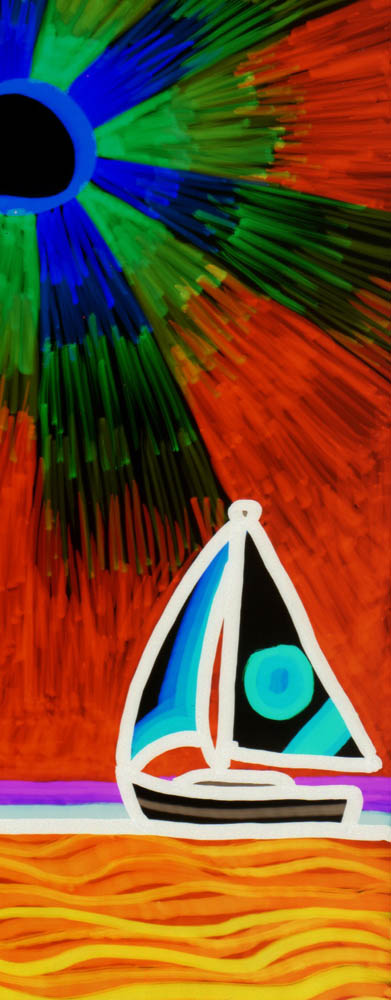
So I guess it’s goodbye for now. Feel free to check out more of Jennifer Weigel’s work here on Haunted MTL or here on her website.
Original Series
Nightmarish Nature: Just Jellies
Today on Nightmarish Nature we’re gonna revisit The Blob and jiggle our way to terror. Why? ‘Cause we’re just jellies – looking at those gelatinous denizens of the deep, as well as some snot-like land-bound monstrosities, and wishing we could ooze on down for some snoozy booze schmoozing action. Or something.
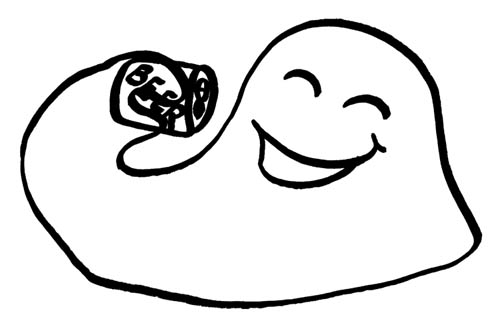
Honestly, I don’t know what exactly it is that jellyfish and slime molds do but whatever it is they do it well, which is why they’re still around despite being among the more ancient organism templates still in common use.
Jellyfish are on the rise.
Yeah, yeah, some species like moon jellies will hang out in huge blooms near the surface feeding, but that’s not what I meant. Jellyfish populations are up. They’re honing in on the open over-fished ocean and making themselves at home. Again.
And, although this makes the sea turtles happy since jellies are a favorite food staple of theirs, not much else is excited about the development. Except for those fish that like to hide out inside of their bells, assuming they don’t accidentally get eaten hanging out in there. But that’s a risk you gotta take when you’re trying to escape predation by surrounding yourself in a bubble of danger that itself wants to eat you. Be eaten or be eaten. Oh, wait…
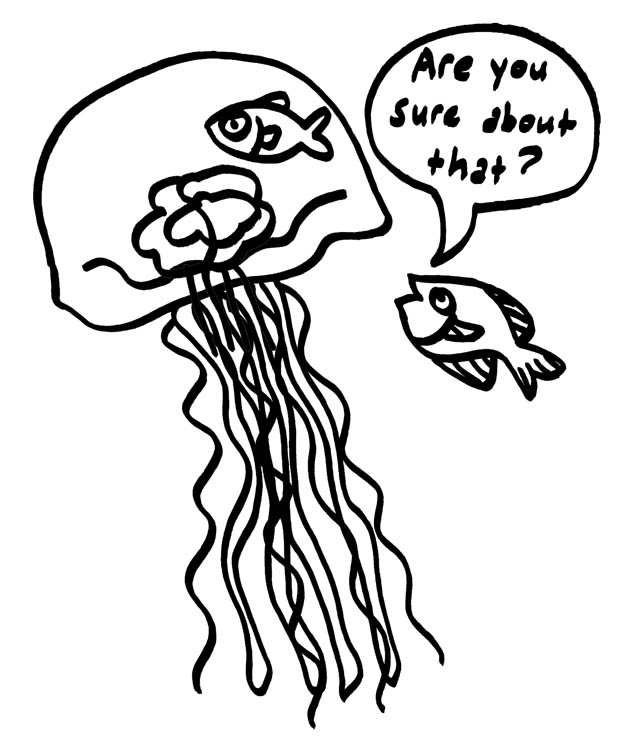
So what makes jellies so scary?
Jellyfish pack some mighty venom. Despite obvious differences in mobility, they are related to anemones and corals. But not the Man o’ War which looks similar but is actually a community of microorganisms that function together as a whole, not one creature. Not that it matters when you’re on the wrong end of a nematocyst, really. Because regardless what it’s attached to, that stings.
Box jellies are among the most venomous creatures in the world and can move of their own accord rather than just drifting about like many smaller jellyfish do. And even if they aren’t deadly, the venom from many jellyfish species will cause blisters and lesions that can take a long time to heal. So even if they do resemble free-floating plastic grocery bags, you’d do best to steer clear. Because those are some dangerous curves.
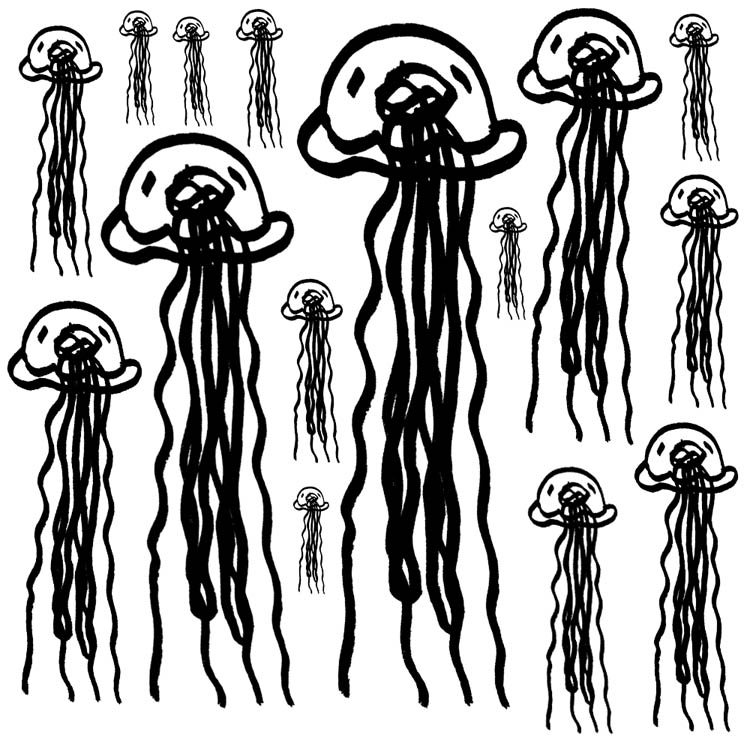
But what does this have to do with slime molds?
Absolutely nothing. I honestly don’t know enough about jellyfish or slime molds to devote the whole of a Nightmarish Nature segment to either, so they had to share. Essentially, this bit is what happened when I decided to toast a bagel before coming up with something to write about and spent a tad too much time in contemplation of my breakfast. I guess we’re lucky I didn’t have any cream cheese or clotted cream…
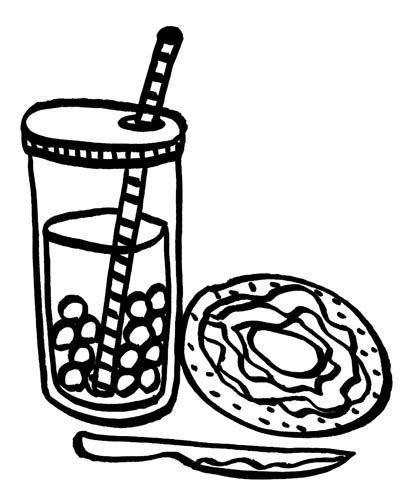
Oh, and also thinking about gelatinous cubes and oozes in the role-playing game sense – because those sort of seem like a weird hybrid between jellies and slime molds, as does The Blob. Any of those amoeba influenced creatures are horrific by their very nature – they don’t even need to be souped up, just ask anyone who’s had dysentery.
And one of the most interesting thing about slime molds is that they can take the shortest path to food even when confronted with very complex barriers. They are maze masterminds and would give the Minotaur more than a run for his money, especially if he had or was food. They have even proven capable of determining the most efficient paths for water lines or railways in metropolitan regions, which is kind of crazy when you really think about it. Check it out in Scientific American here. So, if we assume that this is essentially the model upon which The Blob was built, then it’s kind of a miracle anything got away. And slime molds are coming under closer scrutiny and study as alternative means of creating computer components are being explored.
Jellies are the Wave of the Future.
We are learning that there may be a myriad of uses for jellyfish from foodstuffs to cosmetic products as we rethink how we interact with them. They are even proving useful in cleaning up plastic pollution. I don’t know how I feel about the foodstuff angle for all that they’ve been a part of various recipes for a long time. From what I’ve seen of the jellyfish cookbook recipes, they just don’t look that appealing. But then again I hate boba with a passion, so I’m probably not the best candidate to consider the possibility.
So it seems that jellies are kind of the wave of the future as we find that they can help solve our problems. That’s pretty impressive for some brainless millions of years old critter condiments. Past – present – perpetuity! Who knows what else we’d have found if evolution hadn’t cleaned out the fridge every so often?
Feel free to check out more Nightmarish Nature here.
Original Series
Lucky Lucky Wolfwere Saga Part 4 from Jennifer Weigel
Continuing our junkyard dawg werewolf story from the previous St. Patrick’s Days… though technically he’s more of a wolfwere but wolfwhatever. Anyway, here are Part 1 from 2022, Part 2 from 2023 and Part 3 from 2024 if you want to catch up.
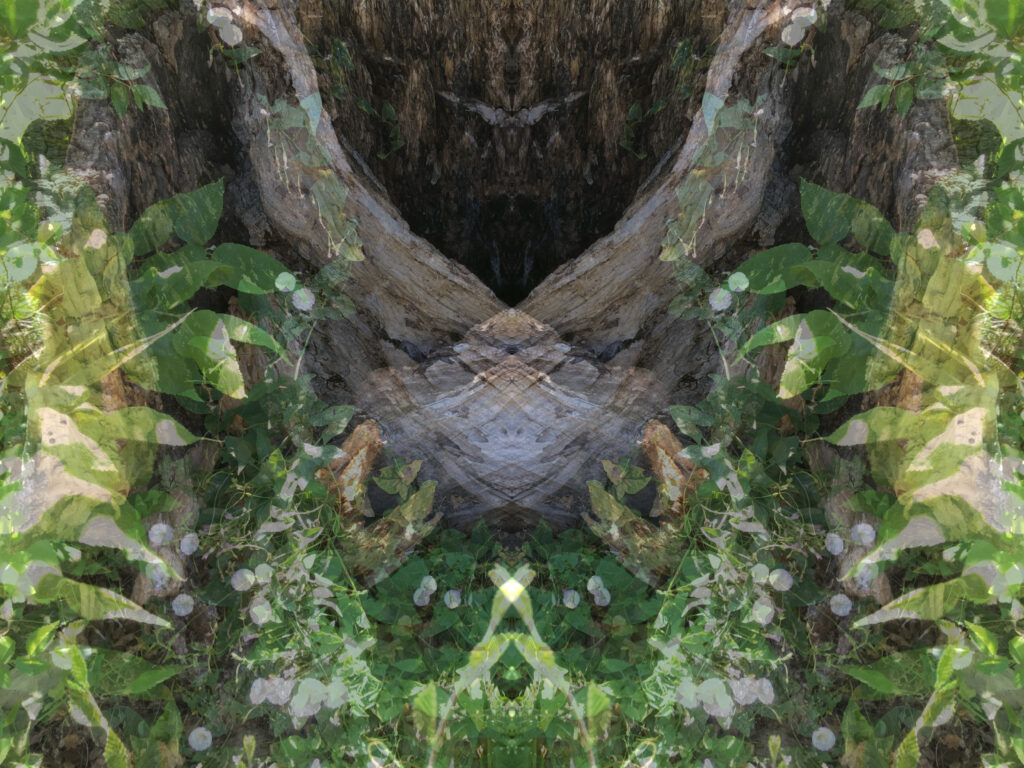
Yeah I don’t know how you managed to find me after all this time. We haven’t been the easiest to track down, Monty and I, and we like it that way. Though actually, you’ve managed to find me every St. Patrick’s Day since 2022 despite me being someplace else every single time. It’s a little disconcerting, like I’m starting to wonder if I was microchipped way back in the day in 2021 when I was out lollygagging around and blacked out behind that taco hut…
Anyway as I’d mentioned before, that Scratchers was a winner. And I’d already moved in with Monty come last St. Patrick’s Day. Hell, he’d already begun the process of cashing in the Scratchers, and what a process that was. It made my head spin, like too many squirrels chirping at you from three different trees at once. We did get the money eventually though.
Since I saw you last, we were kicked out of Monty’s crap apartment and had gone to live with his parents while we sorted things out. Thank goodness that was short-lived; his mother is a nosy one for sure, and Monty didn’t want to let on he was sitting on a gold mine as he knew they’d want a cut even though they had it made already. She did make a mean brisket though, and it sure beat living with Sal. Just sayin.
Anyway, we finally got a better beater car and headed west. I was livin’ the dream. We were seeing the country, driving out along old Route 66, for the most part. At least until our car broke down just outside of Roswell near the mountains and we decided to just shack it up there. (Boy, Monty sure can pick ‘em. It’s like he has radar for bad cars. Calling them lemons would be generous. At least it’s not high maintenance women who won’t toss you table scraps or let you up on the sofa.)
We found ourselves the perfect little cabin in the woods. And it turns out we were in the heart of Bigfoot Country, depending on who you ask. I wouldn’t know, I’ve never seen one. But it seems that Monty was all into all of those supernatural things: aliens, Bigfoot, even werewolves. And finding out his instincts on me were legit only added fuel to that fire. So now he sees himself as some sort of paranormal investigator.
Whatever. I keep telling him this werewolf gig isn’t all that it’s cracked up to be, and it doesn’t work like in the movies. I wasn’t bitten, and I generally don’t bite unless provoked. He says technically I’m a wolfwere, to which I just reply “Where?” and smile. Whatever. It’s the little things I guess. I just wish everything didn’t come out as a bark most of the time, though Monty’s gotten pretty good at interpreting… As long as he doesn’t get the government involved, and considering his take on the government himself that would seem to be a long stretch. We both prefer the down low.
So here we are, still livin’ the dream. There aren’t all that many rabbits out here but it’s quiet and the locals don’t seem to notice me all that much. And Monty can run around and make like he’s gonna have some kind of sighting of Bigfoot or aliens or the like. As long as the pantry’s stocked it’s no hair off my back. Sure, there are scads of tourists, but they can be fun to mess around with, especially at that time of the month if I happen to catch them out and about.
Speaking of tourists, I even ran into that misspent youth from way back in 2021 at the convenience store; I spotted him at the Quickie Mart along the highway here. I guess he and his girlfriend were apparently on walkabout (or car-about) perhaps making their way to California or something. He even bought me another cookie. Small world. But we all knew that already…
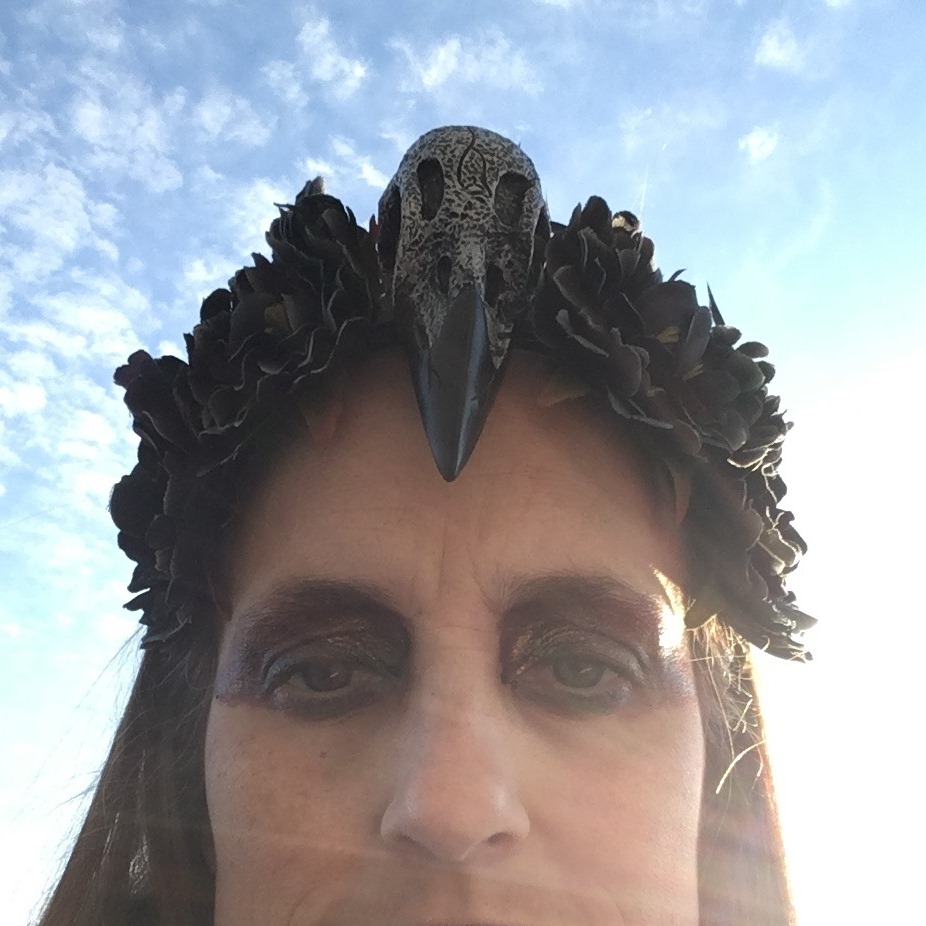
If you enjoyed this werewolf wolfwere wolfwhatever saga, feel free to check out more of Jennifer Weigel’s work here on Haunted MTL or here on her website.

